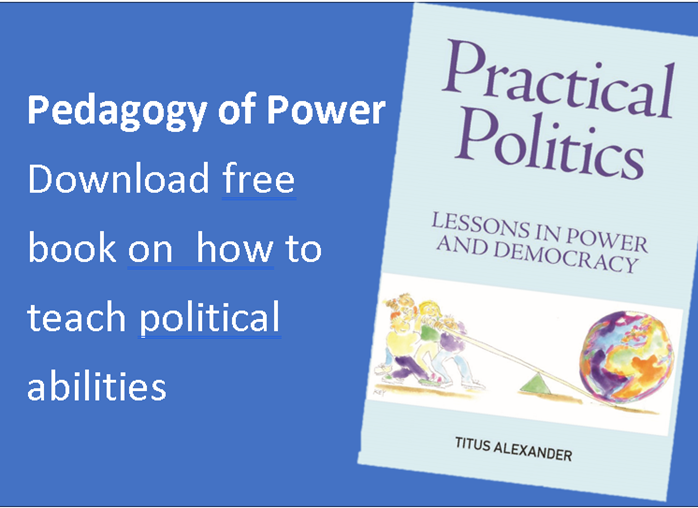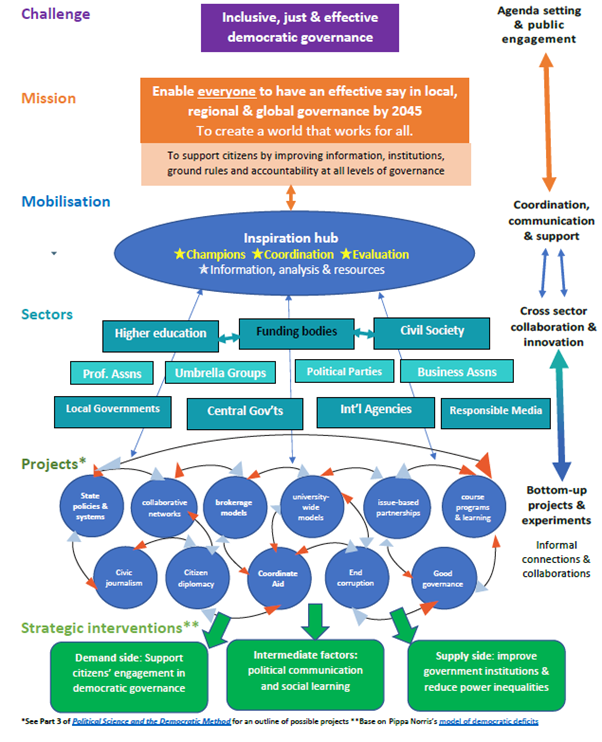Politics is difficult, but few places teach people how to do it. The world’s biggest problems are political, but humanity lacks political abilities to solve them. Understanding how the system works and influence decisions are essential skills for every citizen, but few get the opportunity to learn them.
For democracy to work everyone needs to be able to do politics as a basic skill, like reading and writing. This book can help you make the case for teaching practical politics. It provides insights into power and democracy to show how education can create opportunities for people to learn how to resolve political problems at every level, from office politics to global governance. It provides the basis for practical politics as a subject in schools, higher education and the community..
This is being made available for educators to use and review for a possible second edition under the title Pedagogy of Power: Learning for Democracy.
You can download a free copy here: https://bit.ly/PP-Final – email comments to Titus: TitusA03(a)gmail.com
Some chapters can be downloaded separately: follow the links below –
Contents
Foreword by Peter Scott, Professor of Higher Education
Preface: Why this book was written & who it is this book for
Part 1: Politics as a public good
- Introduction
Why need education for practical politics
The scope of practical politics
Abuse of power
The use of power
Sharing power
What is democracy?
Why teach practical politics at university?
Academic foundations
2. What is politics?
Case study: community organizing
What is a unit of rule?
Family politics
What are our units of rule?
Rule-making for freedom and responsibility
Companies as units of rule
Defining politics: who gets what, when and how
The purpose of politics
2 What is not politics?
Politics as social problem solving
Case study: school students act on female genital mutilation
Confronting social problems
The great global transformation
Knowledge and action
Knowledge also creates problems
Social problems are political
Governance as political problem solving
Problems with democracy
Improving governance
4. Arenas: where politics happens
Case study: Gross Deceptive Product
The politics of supra-politics
Complexity and supra-politics
Influencing supra-politics
The drama of public politics
Party politics
Electoral politics
Parliamentary politics
The politics of governing
The politics of association
Revolutionary politics
Cyber politics
Part 2: Lessons in power
This section looks at the way in which power is used, by whom and for what purposes.
5. Political education of the powerful
Case study: Campaign coaching
The political education of politicians
The pedagogy of power
Politics and business
Corporate power
The power broking business
Inequality of influence
Responsible lobbying
Trust in business and politics
Political education by the media
6. All politics is office politics
Case studies: Jubilee 2000 and the Great Crash
Why office politics matters
Changing the story
Blowing the whistle
Blowing the trumpet
The Core Group
Who are the educators for office politics?
The politics of accounting
Management consultancy: education for office politics
Case study: Project for a New American Century (PNAC)
Understanding power
What is the nature of power?
Purpose: what is it good for?
What are the instruments of power?
What are the sources of power?
Power gradients
Spheres of power (power petals)
Levels of power: local, institutional, national, continental or global
Political spaces: what access to power do people have?
Who takes part? What are visible, hidden and invisible forms of power?
Degrees of freedom: how much scope do people have to exercise power?
Part 3: Learning for democracy
Part Three provides more detail on how people can learn practical politics.
Case study: Learning about justice
Teaching practical wisdom
Higher education for democracy
Learning through social action
Intelligence services for democracy
Learning to lead and govern
Building capacity for democratic citizenship
Ethics for learning through action
9. Foundations for learning democracy: political education in schools
Democratic education: a battle of ideas
Schools in a global society
Citizenship and educational achievement
What are citizenship schools?
Politics in the curriculum
Political education and indoctrination
Citizenships and political education in England
Opportunities for renewal
Case study: Medellin – city of innovation
Charities, non-profits and civil society
Local government and public services
Political education by parties
Civic leaders as representatives of democracy
Political education through the media
Adult political education
11. Making the case for teaching practical politics
How do new subjects take off?
Ten steps to curriculum change
Your strategy for practical political education
Dealing with opposition
12. How to create a curriculum for democracy
Case study: How the Kahn Academy creates change by providing a service
Stepping stones on a learning journey for democracy
Learning needs analysis
Progression routes in practical politics
Twelve elements of a curriculum for action
Conclusion: Next steps – over to you
Please share your experience with Titus: TitusA03(a)gmail.com


